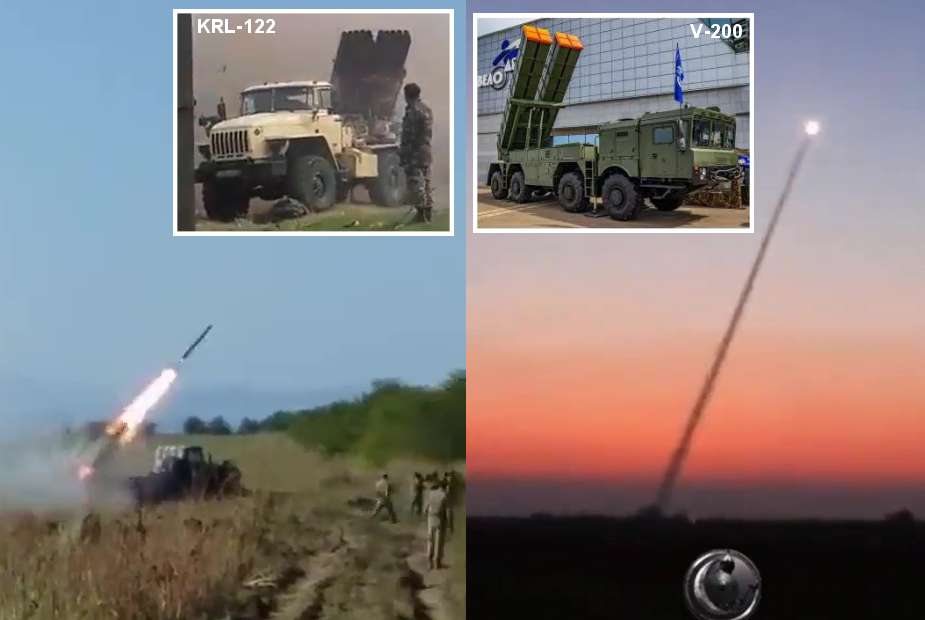Breaking news
Azerbaijan deploys KRL-122 and V-200 Polonez MLRS against Armenian positions.
According to PagerAfrica and Clash Report on September 19, 2023, the Azerbaijani Armed Forces carried out both daytime and nighttime operations against Armenian positions in the ongoing Nagorno-Karabakh conflict, while using Pakistani-made KRL-122 and Belarusian-made V-200 Polonez Multiple Launch Rocket Systems (MLRS).
Follow Army Recognition on Google News at this link

Azerbaijan deploys KRL-122 and V-200 Polonez MLRS during combat operations against Armenian positions (Picture source: Twitter and Yandex)
The KRL-122, also known as Gadab, is a rocket launcher system based on the BM-21 Grad MLRS system. Initially mounted on an Isuzu truck chassis, it was later adapted to the Reo M35 truck platform. This system has the capability to launch both original Soviet rockets and the indigenous Yarmuk Rocket developed by Pakistan Ordnance Factories. It can reach a maximum range of over 40 kilometers with its enhanced 122mm rockets. The KRL-122 can be mounted on vehicles or used as a trailer-mounted system. In this specific instance, it appears to be based on a Ural-375D six-by-six truck chassis and is powered by a water-cooled V-8 180 hp gasoline engine ZIL-375. It offers a 180° traverse capability and can adjust elevation from 0 to 55°, providing both electric and manual control options.
The V-200 Polonez, also known as Polyanez, is a Belarusian 300mm MLRS that can launch various types of rockets, including guided and unguided missiles with different warheads. It maintains accuracy within a 30-meter deviation even at its maximum range of 200 km. Designed by Igor Dantsov and Yuri Cherny, the system was developed by the "Plant of Precise Electromechanics" in Belarus and was unveiled on May 9, 2015, during a military parade in Minsk. An upgraded variant, the Polonez-M, boasts an extended firing range of 299 km, representing a 50% increase in capabilities.
The Nagorno-Karabakh conflict is a longstanding territorial dispute between Azerbaijan and its Armenian-majority population, supported by Armenia. It traces its origins to over a century ago when tensions emerged between Christian Armenians and Muslim Turkic Azeris. In the early 20th century, Karabakh, an area inhabited by both Armenians and Azeris, fell under Russian control. Soviet authorities established the Nagorno-Karabakh Autonomous Region within the Soviet Socialist Republic of Azerbaijan, despite its predominantly Armenian population.
The situation escalated in 1991 with the dissolution of the Soviet Union, leading to a full-fledged conflict between Armenian and Azerbaijani forces. The hostilities from 1992 to 1994 resulted in significant casualties and the Armenians gaining control of Nagorno-Karabakh and surrounding Azerbaijani territories. A truce facilitated by Russia in 1994 left Nagorno-Karabakh and neighboring regions under Armenian administration, accompanied by a large-scale displacement of residents.
From 1994 to 2020, the region remained in a fragile ceasefire status, occasionally disrupted by armed confrontations. In 2017, a plebiscite led to the adoption of a new constitution, changing the official name from the Nagorno-Karabakh Republic to the Republic of Artsakh, with both titles recognized. In 2020, the Second Karabakh War erupted, resulting in Azerbaijan reclaiming territory near Karabakh. Russian peacekeepers were deployed to oversee the truce, including the strategically vital "Lachin corridor" connecting Nagorno-Karabakh to Armenia.
In 2022, skirmishes occurred along the Armenia-Azerbaijan border, causing casualties on both sides. Disputes arose over the Lachin corridor, with Armenia citing a humanitarian crisis due to an Azerbaijani blockade, while Azerbaijan advocated for separate routes for civilian and cargo transport. Despite international efforts, such as those by the OSCE's Minsk Group and the European Union, the Nagorno-Karabakh conflict remains unresolved.


























